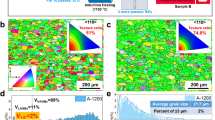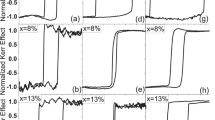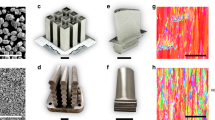Abstract
ALTHOUGH rhodium is a face-centred cubic metal which should possess numerous planes and directions of slip it is, at room temperature, an extremely difficult metal to form into strip and wire. Usually rhodium is hot-worked, the working temperature being gradually reduced during successive stages until the metal develops a fibrous structure, when at thin gauges it can be subjected to moderate cold-working operations.
This is a preview of subscription content, access via your institution
Access options
Subscribe to this journal
Receive 51 print issues and online access
$199.00 per year
only $3.90 per issue
Buy this article
- Purchase on Springer Link
- Instant access to full article PDF
Prices may be subject to local taxes which are calculated during checkout
Similar content being viewed by others
References
Bale, E. S., Platinum Metals Rev., 2, 61 (1958).
Davis, M., Calverley, A., and Lever, R. F. T., J. App. Phys., 27, 195 (1956).
Calverley, A., Davis, M., and Lever, R. F., J. Sci. Instr., 34, 142 (1957).
Author information
Authors and Affiliations
Rights and permissions
About this article
Cite this article
CALVERLEY, A., RHYS, D. Ductility of Rhodium. Nature 183, 599–600 (1959). https://doi.org/10.1038/183599a0
Issue Date:
DOI: https://doi.org/10.1038/183599a0
This article is cited by
-
Heating by Electron Bombardment
Nature (1959)
Comments
By submitting a comment you agree to abide by our Terms and Community Guidelines. If you find something abusive or that does not comply with our terms or guidelines please flag it as inappropriate.



